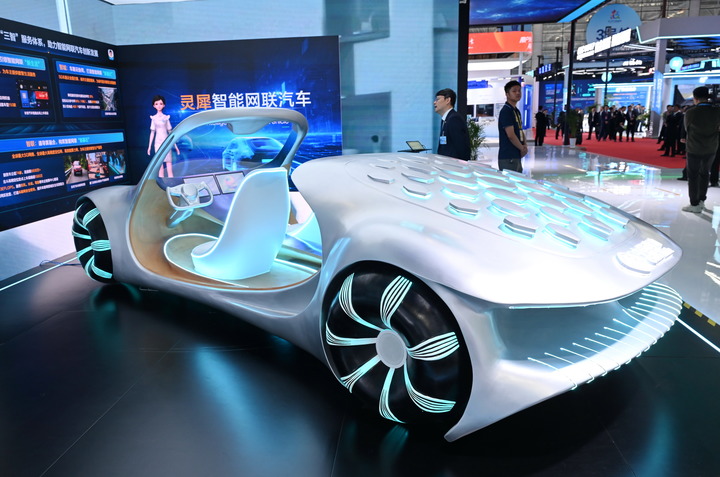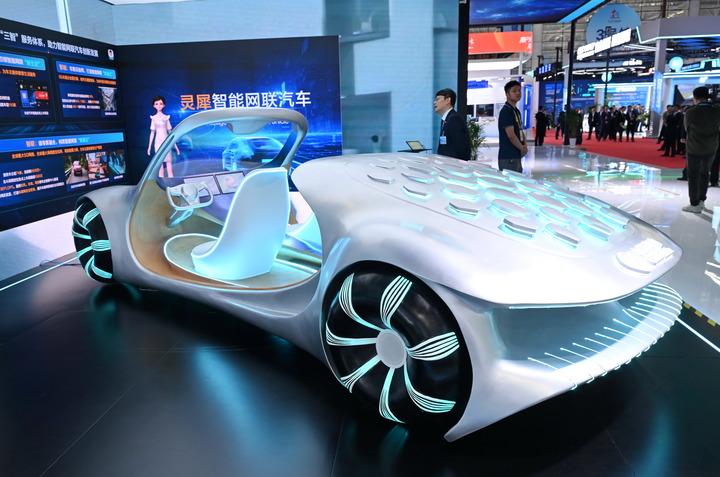
An intelligent connected vehicle is pictured at the 8th Digital China Summit in Fuzhou, southeast China's Fujian Province, April 29, 2025. (Xinhua/Lin Shanchuan)
BEIJING, July 31 (Xinhua) -- Shanghai granted a new batch of intelligent connected vehicle (ICV) demonstration operation licenses at the Models Lead Intelligent Future themed AI-empowered Autonomous Driving Innovation and Development Forum during the 2025 World Artificial Intelligence Conference (WAIC). The first group of licensed companies covers scenarios such as smart mobility, long-haul logistics, and last-mile delivery, reported Xinhua-run Shanghai Securities News.
Industry experts believe that the year of 2025 marks a historic turning point for autonomous driving, transitioning from technical validation to large-scale commercial application.
With cities like Shanghai expanding pilot programs and refining regulations, China's autonomous driving industry is poised to leverage its systemic, scale, and application advantages, shifting from technological innovation to industrial transformation.
-- Commercialization path opening
The newly issued licenses cover two key sectors namely smart taxis and smart freight, with recipients including companies such as Baidu's smart driving Shanghai branch and Dazhong Transportation (Group) Co., Ltd.
"This demonstration operation permits public fee-based services with regulatory-approved driverless vehicles, laying a solid foundation for future commercialization," said a representative from an autonomous driving firm, noting that residents will soon be able to hail self-driving cars within service areas, making the technology more tangible while boosting public confidence.
Innovation in operation model is also highlighted, "the collaboration between traditional taxi companies and tech firms balances technology and operational standards, potentially offering a 'Shanghai Solution' for sustainable industry growth," noted an executive from Pony.ai.
Supportive policies have accelerated industry progress. By August 2024, China had issued 16,000 autonomous vehicle test licenses and opened 32,000 kilometers of public test roads. Shanghai's latest move signals a new phase of normalized, large-scale ICV operations, industry observers said.
According to an action plan released during the forum on building Shanghai a smart driving pilot, the city targets to achieve 6 million L4 autonomous passenger trips and over 800,000 TEUs of freight by 2027. The city will open more than 5,000 kilometers of roads across 2,000 square kilometers, with L2/L3 vehicles accounting for 90 percent of new car production and L4 vehicles entering mass production.
Shanghai plans to gradually expand autonomous driving zones, including full coverage in Pudong New Area and key districts like Fengxian and Minhang, while interlinking test areas across the city, according to a source with Shanghai municipal commission of economy and informatization.
-- Entering uncharted waters
The industry is entering a more complex phase. Data-driven end-to-end solutions are gaining traction, replacing traditional modular architectures by using deep learning to generate control signals directly from sensor data.
Meanwhile, algorithms demand more sophisticated "world models" -- AI frameworks simulating environmental dynamics. "IM Motors integrates data-driven and knowledge-driven approaches, combining end-to-end and multimodal large models for enhanced performance," said Guo Hui, deputy CTO of IM Motors.
As computing power grows, world models may soon be deployed in vehicles, advancing toward general AI for autonomous driving, according to Guo.
-- Scaling up applications
"The industry is on the cusp of dawn," remarked an industry insider. Commercialization hinges on scaling applications, with pilot projects now booming across personal transport, logistics, buses, and specialized settings like mines.
"L4 autonomy has clear business models in ports and mines," said Yin Xiaochuan with Utopilot, which operates more than 400 autonomous trucks globally. Its Yangshan Port project was among the newly licensed initiatives.
While technical feasibility and safety were earlier priorities, the depth and scale of application are key to industry development in industrialization phase, according to Wu Qiong, an autonomous driving expert at Chinese tech giant Baidu, emphasizing that effective institutional frameworks are now as critical as technological breakthroughs in driving industry progress.
"Road access and regulations are the main barriers to scaling low-speed L4 vehicles," said Hao Binbin, CEO of tech company Zhejiang Tongtongda, noting that only with policy advancements can deployments grow from tens of thousands to millions. (Edited by Niu Huizhe with Xinhua Silk Road, niuhuizhe@xinhua.org)




 A single purchase
A single purchase









